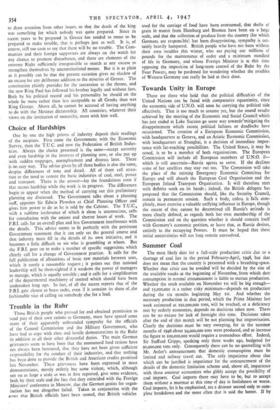Choice of Hardships
One by one the high priests of industry deposit their readings of the auspices. First came the Government with the Economic Survey, then the T.U.C. and now the Federation of British Indus- tries. Always the choice presented is the same—accept austerity and even hardship in the interests of planning now, or else put up with sudden stoppages, unemployment and distress later. There is no easy way. The advice given by all three bodies is also the same, despite differences of tone and detail. All of them call atten- tion to the need to restore the basic industries of coal, steel, power and transport. There is the answer—lay the foundations even if that means hardship while the work is in progress. The differences begin to appear when the method of carrying out this preliminary planning are discussed. The Government talks about a planning staff, appoints Sir Edwin Plowden as Chief Planning Officer and gives him power to do as he is told by the Cabinet. The T.U.C., with a sublime irrelevance of which it alone is unconscious, calls for consultation with the unions and shorter hours of work. The F.B.I. calls for an overall plan and less Government interference with the details. This advice seems to fit perfectly with the persistent Government statement that it can only set the general course and that industry must fill in the details of its own initiative, and it becomes a little difficult to see who is grumbling at whom. But the F.B.I. goes on to make a number of specific suggestions which clearly call for a change of Government practice. It calls for the full publication of allocations of basic raw materials between uses, which is surely a reasonable request ; it points out that national leadership will be short-sighted if it weakens the power of managers to manage, which is equally sensible ; and it calls for a simplification of the departmental machinery of control which should have been undertaken long ago. In fact, of all the recent reports that of the F.B.I. gets closest to brass tacks, even if it contains its share of. the fashionable vice of calling on somebody else for a lead.


































 Previous page
Previous page